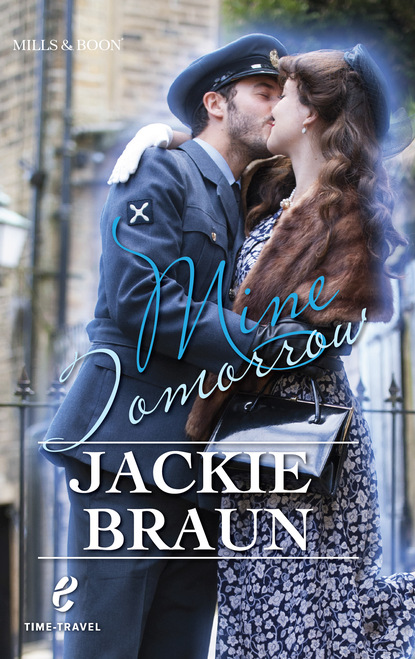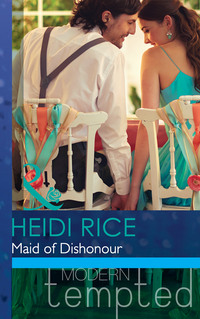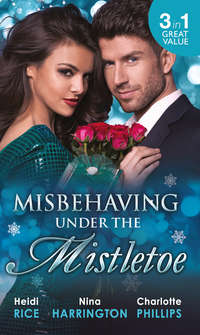
Полная версия
Movie Bliss: A Hopeless Romantic Seeks Movies to Love
So, is George and Mary’s marriage a romantic fantasy?
You betcha, but isn’t it one we can all aspire to? And isn’t that the same quality you love to unwrap in your favourite series romance? For me, the fast cars, the luxury homes, the designer wardrobe, even the glistening pecs, the awesome six-pack and the sex-god abilities between the sheets are just the sparkly tissue paper. It’s what’s underneath that counts—the good, strong, steady, dependable heart that’s beating just for you. That’s the real present, the gift you want that will keep on giving….
All right, I’m getting a little carried away now, but you get my drift. Especially if you watch this film on Christmas Eve in front of your bauble-laden tree and a roaring fire with either friends, family or the love of your life—or even just your favourite series romance—snuggled by your side.
On the Waterfront (1954): Brando in His Prime Does Bad Boys Proud
Directed by Elia Kazan
Starring:
Marlon Brando as Terry Malloy
Eva Marie Saint as Edie Doyle
Karl Malden as Father Barry
Lee J. Cobb as Johnny Friendly
Rod Steiger as Charley Malloy
A now-little-seen black-and-white social drama, Elia Kazan and Budd Schulberg’s tale of labour relations on the New Jersey docks circa 1954 is not a romance, but it has at its centre a love story that is so real and so beautifully evoked in only a few scenes it‚s bound to tear at your heart. Plus it’s performed by surely the greatest film actor of all time in his prime (long before he became the size of a small semi-detached house) and an actress who is not only luminously lovely but also sadly underrated IMHO. The chemistry between them in this movie is raw and provocative and poignant and so powerful that their love story is as fresh and real now as it was over half a century ago. And those are just a few reasons why it is my favourite film of all time.
Now, as it happens, it’s the love story in this movie that resonates so beautifully for me, so I’m going to dwell on that and not the rest of the movie—although that’s pretty spectacular, too. Anyone ever heard of Brando’s ‘I coulda been a contenda’ speech? That comes from this multi-Oscar-winner.
So let’s do a quick plot recap. The setting is the New Jersey docks in the 1950s, where the longshoremen’s union is controlled by corrupt thug Johnny Friendly and his right-hand man, Charlie the Gent. Charlie’s younger brother Terry (a thirty-something has-been ex-boxer) has been inadvertently involved in the killing of Joey, one of the longshoremen who was threatening to ‘squeal’ to the crime commission. Terry feels bad about it, but that’s life on the docks. He’s not about to rat out his brother. Until he meets Joey’s distraught sister Edie….
The drama that follows is about Terry’s battle with his conscience, and the harsh life of America’s dockworkers…. It’s social realism through and through, with a cast full of brilliant method actors, a wonderfully understated script by Budd Schulberg, and haunting black-and-white photography. But it’s the developing relationship between Edie and Terry that drives the story and is the heart and soul of the whole movie.
Take their first meeting, when the rough and inarticulate Terry tugs on Edie’s glove and sits on a kids’ swing while chatting to her with offhand bravado about his miserable childhood—Edie responds with quiet class and what Terry sees as a kooky naiveté. But Edie’s attitude isn’t really naiveté at all— it’s the simple belief that if people are loved they can rise above their circumstances….
Cut to the scene in a dingy neighbourhood bar where Terry (not knowing what to do with a nice girl) takes Edie on a sort of date and proceeds to ply her with drink:
Edie says, a little drunk, ‘Shouldn’t everyone care about everyone else?’
And Terry replies, ‘Boy, what a fruitcake you are.’
But as he says it, the tender astonishment in Terry’s eyes shows he’s already falling in love with this girl who’s sweet and innocent, but has the strength of character to rise above the roughness of slum life rather than be beaten down by it as Terry has been.
Always lurking in the background as they are becoming more attached to each other is the terrible truth about Terry’s involvement in Edie’s brother’s murder. The powerful, intensely dramatic and heartbreaking moment when Terry finally confesses his part in Joey’s murder, we don’t hear Terry’s words—they’re drowned out by a ship’s blaring horn—but we see Edie’s face, going from love to horror….
And then the wildly passionate scene when Terry breaks into Edie’s apartment and they kiss… It’s raw, it’s emotional, it’s desperate, as Terry, unable to voice how he feels, shows Edie the only way he knows how. And she submits, because despite Terry’s guilt, despite the bad things he’s done, she can see the good man he wants to be. Phwoar! I defy anyone not to be blown away by that kiss.
Okay, so this movie may be a little too intense and dramatic for a Girls’ Night In, but it’s definitely worth a peek if you like your romance occasionally raw and realistic and heartbreakingly honest. Plus Brando is beyond gorgeous in this movie—all rough, ready and raw, with inarticulate, pure animal magnetism (just think Tom Hardy without the tattoos, basically).
The Long, Hot Summer (1958): When Paul Met Joanne…
Directed by Martin Ritt
Starring:
Paul Newman as Ben Quick
Joanne Woodward as Clara Varner
Orson Welles as Will Varner
Anthony Franciosa as Jody Varner
Lee Remick as Eula Varner
Angela Lansbury as Minnie Littlejohn
Okay, I’m going to ask you to indulge me a little bit with this sultry, sparky, smoulderingly sexy 1950s romance—because The Long, Hot Summer is very close to my heart. Simply put, it’s the film that turned me on to the wonders of bad boys and romance and the fabulousness of Paul Newman at the impressionable age of thirteen, when I first saw it at the National Film Theatre (an art-house cinema showing old movies on London’s South Bank) during one long-ago long, hot summer (appropriately).
Now, Mr Newman was an incredibly gorgeous man—sonnets could have been written about those chiselled cheekbones, his lean muscular physique and, of course, those unfathomable blue eyes. And he’s at his moody and magnificent best in this movie. But while his looks are certainly breathtaking, that’s only a small part of the package that makes this movie worth its weight in gold to any self-respecting romance junkie (like moi).
First off, there’s the premise (very loosely based on a William Faulkner story), which is quite simply a romance author’s dream. And any author who’s ever had trouble finding that all-important conflict in a story (waves hand in the air) should take notes at this point.
As Ben Quick, a drop-dead-gorgeous drifter with a dangerous reputation, Paul is the quintessential bad boy. All smouldering sexuality, mercenary charm and devil-may-care arrogance, Ben swaggers into Clara Varner’s steamy southern town in the middle of a heatwave and immediately sets Clara’s neat and tidy life on fire after making a Faustian bargain with Clara’s dad, Will—a Big Daddy–style demagogue who’s determined to see his only daughter wedded and bedded and making babies.
Will is a self-made man (played with fabulous OTT bluster by Orson Welles), and he sees in Ben a lean, hungry wolf who’s a chip off the old block, a man who’ll do anything to live the easy life—including seduce a woman into marriage for a share of her daddy’s money.
But Clara’s a smart woman with principles; she’s wise to her father’s schemes and she’s determined not to fall for Ben. She wants refinement and intelligence in her marriage, a man with scruples and standards, a man who loves her, not just a handsome stud who can get her hormones doing the hula….
As she puts it to Ben, ‘I’ve spent my whole life around men who push and shove and shout and think they can make anything happen just by being aggressive, and I’m not anxious to have another one around the place.’
Yeah, right! What? Is she insane? This is Paul Newman in his prime we’re talking about, and he’s totally focussed on making her fall for him. Even to the point of bidding a fortune for her picnic at a local county fair so she’s forced to eat lunch with him. What could be sexier or harder to resist?
Okay, sorry, getting a grip here. Luckily, Clara’s got a lot more integrity than I do (I would have said yes in a heartbeat and the movie would have been over) and she doesn’t give in….
Not until she sees there’s a chink in Ben’s armour. Maybe he’s not as self-assured and ruthless as he pretends to be, maybe there’s actually someone worth taming behind all that arrogant, audacious sex appeal….
But quite apart from the fabulous characters, all that sizzling sexual tension and full-steam-ahead conflict, what really makes this movie stand out is the casting—and the real-life love story behind it. Because as well as Paul Newman in all his glory, we have a young Joanne Woodward cast opposite him as Clara at the exact moment when the two of them were falling in love for real.
The sparks seem to fly off the screen, and this explains exactly why these two had a marriage that defied Hollywood convention and lasted half a century—right up until Paul’s death in 2008 at the grand old age of eighty-three.
When I walked out of the NFT that long-ago summer, I had set my heart on marrying Paul one day. Needless to say, I was a tad miffed to discover he was already taken (not to mention nearly old enough to be my granddad), but when I found out he’d married Clara, well, I was prepared to take it on the chin—because I’d fallen for Joanne, too. She was more than a match for him, and I’d seen exactly why the two of them deserved their Happy Ever After.
They were meant to be together and the evidence is all right here in glorious Technicolor. Watch it and see for yourself.
So if you’re ever in the mood to reaffirm your love of romance or looking for proof positive that there is such a thing as a love that lasts forever, go hunt this movie down on Netflix or catch it the next time it’s on telly. Wait for the scene when Paul’s Ben says to Joanne’s reluctant Clara,
All right then, run, lady, and keep on running. Buy yourself a bus ticket and disappear. Change your name, dye your hair, get lost—and then maybe, just maybe, you’re gonna be safe from me.
And feel the shiver run down your spine.
The Apartment (1960): Mad Men with Laughs
Directed by Billy Wilder
Starring:
Jack Lemmon as C. C. Baxter
Shirley MacLaine as Fran Kubelik
Fred MacMurray as Jeff D. Sheldrake
Ray Walston as Joe Dobisch
Jack Kruschen as Dr Dreyfuss
The rom-com against which all others must be judged (and most will be found wanting), writer-director Billy Wilder’s tale of the troubled romance between an ambitious young insurance adjuster and a heartsick elevator operator was made over fifty years ago but, like all great romances, can effortlessly capture your heart to this day.
As well as the incomparable script, what makes this movie really shine is the perfect casting of a young and adorable Jack Lemmon as an eager-to-please office drone in a huge Manhattan insurance firm—and a young and equally adorable Shirley MacLaine as the smart, pretty lift girl whom he fancies from afar but whose chirpy persona hides a heartbreaking secret.
How does he find out her secret? Well, that’s part of the movie’s brilliant premise—and where the title comes in.
Lemmon’s character C. C. Baxter, you see, is an average low-level employee, but he has ambition, courtesy of his downtown bachelor pad, which he allows his married bosses to use for their clandestine affairs on a nightly basis. So far so Mad Men.
C.C. isn’t really as calculating and cynical as that state of affairs suggests, though. He’s just a cog in a rather corrupt and unpleasant wheel, trying to get ahead. In fact, his apartment-loaning service has sort of backfired on him, because given the power dynamics of the situation (and his rather weak will), C.C. can’t say no when he’s asked to loan out his home at all hours of the night. But C.C.’s wake-up call, his discovery that what he is doing is really much more seedy than he has realised, comes when he is asked by top boss Mr Sheldrake (a brilliantly slimy performance from Fred MacMurray) to loan out his apartment key exclusively for Sheldrake’s latest extramarital fling.
C.C. thinks he’s finally going to get the promotion he’s been hoping for and is delighted with himself, until he makes the devastating discovery (in a poignant, bittersweet exchange at an office Christmas party) that Sheldrake’s latest conquest is none other than Fran Kubelik, the elevator girl he adores. But much worse is yet to come. What he doesn’t yet know is that Fran is as sweet and vulnerable as she appears. Fran has believed Sheldrake’s lies about leaving his wife, and when she is finally beaten down by her lover’s neglect and cruel manipulation she takes an overdose of sleeping pills…on Christmas Eve in the apartment of you-know-who.
C.C. comes back to find her passed out in his bed, and that’s when the comedy takes a dark turn, giving way to a moving and eventually heart-wrenching romance about two people cast adrift in the big city, who must learn not only to love each other, but to love themselves, as well.
I’ve probably given away far too much of the plot. But actually, it’s hard to describe how subtle and wonderfully nuanced this story is—and how remarkably real, even now. Portraying the sexual politics of New York office life, circa 1960, with an honesty and complexity and conspicuous lack of glamour, the film is both a brilliant snapshot of a bygone era and also a remarkably contemporary love story. Both Lemmon and MacLaine play superbly to type—but even the supporting roles, of Lemmon’s seedy line managers, the brash office totty, C.C.’s harassed next-door neighbours, are expertly realised.
If you’ve ever wondered what Mad Men might be like with a lot more laughs, then you need look no further than this beautifully observed, surprisingly dark and yet eventually heart-warming movie that continues to get better and better with age.
The Thomas Crown Affair (1968): How to Beat a Guy at Chess, Every Time
Directed by Norman Jewison
Starring:
Steve McQueen as Thomas Crown
Faye Dunaway as Vicki Anderson
Paul Burke as Eddie Malone
Jack Weston as Erwin
Biff McGuire as Sandy
I adore Steve McQueen. He is the King of Cool for a very good reason. The ultimate movie bad boy, he oozes tough, rugged sex appeal in all his movies, even the rubbish ones. But I’ve always thought that The Thomas Crown Affair is his sexiest screen appearance. A romantic-heist-thriller wrapped in stylish sixties chic and packed with enough sexual tension to blow anyone’s socks off—it’s as cool and sexy today as it was in 1968.
The plot has Steve’s bad-boy billionaire pulling the ‘perfect’ heist, because he’s bored. A dark mix of the smouldering Presents guy and the cool KISS hero, financier Thomas Crown is a man who doesn’t need any more money. But having made his millions, legitimate business no longer challenges him, so he starts seeking his thrills elsewhere. What he hasn’t counted on after his latest heist, though, is getting a few more thrills than he bargained for when Faye Dunaway’s smart, savvy and uber-sexy insurance investigator is sicced on his tail. Because Faye, you see, is the perfect KISS heroine. With a brilliant mind that matches Crown’s, not to mention amazing legs and a razor-sharp women’s intuition, Faye immediately pinpoints Steve as the thief, and thus begins a tantalising game of cat and mouse (where we’re never quite sure who’s the cat and who’s the mouse) as they use all the weapons in their arsenal to come out on top (pun fully intended, folks!).
McQueen is brilliantly cast in this movie—he’s superslick on the surface, completely gorgeous but with a dangerous edge, which means that while Faye’s getting the goods on him, she’s also in danger of losing the battle for her heart. Not least because he’s losing his heart to her, too.
But what also makes this movie work so well is that Faye Dunaway is McQueen’s absolute equal—as prepared to use sex to get what she wants as he is. At a time when women’s lib was just starting to come into its own, Dunaway’s ambitious, stylish career woman forced to choose between a hefty pay cheque and the man she has fallen in love with is a feminist icon to be proud of…right up to that bittersweet ending.
And let’s not forget all the lashings of sixties style: ‘The Windmills of Your Mind’ theme song, Steve’s drainpipe suits, Faye’s Mary Quant–like minidresses, dune buggies, polo matches, the gleeful overuse of gimmicky split-screen photography and the sexiest chess match ever put on film—when Faye decides to put the moves on Steve’s consummate player and wins. I have to admit, I totally ripped off that smokin’ hot chess game in my third book, The Tycoon’s Very Personal Assistant, when I had my hero and heroine play strip poker. What can I say? It inspired me.
I should give the stylish nineties Pierce Brosnan/Rene Russo remake an honourable mention here, because it’s also very watchable, but for me, the sixties original is the real deal—and wins the cool-and-sexy stakes hands down. And that’s despite the appearance of Mr Brosnan’s exceptionally pert nekkid butt in The TCA version II!
Конец ознакомительного фрагмента.
Текст предоставлен ООО «ЛитРес».
Прочитайте эту книгу целиком, купив полную легальную версию на ЛитРес.
Безопасно оплатить книгу можно банковской картой Visa, MasterCard, Maestro, со счета мобильного телефона, с платежного терминала, в салоне МТС или Связной, через PayPal, WebMoney, Яндекс.Деньги, QIWI Кошелек, бонусными картами или другим удобным Вам способом.












